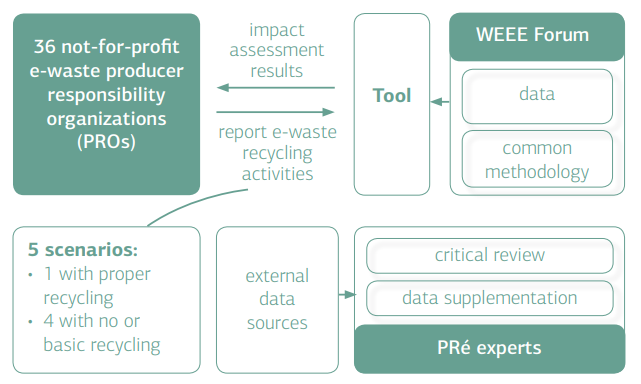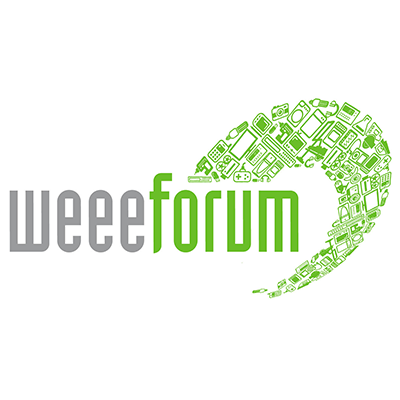Expert review of an assessment tool for e-waste recycling in Europe
Electronics waste, or e-waste, is growing fast. For WEEE Forum, PRé completed databases and did an expert review of their e-waste recycling assessment tool, comparing various recycling scenarios.
About
Waste of electrical and electronic equipment (WEEE) such as computers, TV sets, refrigerators and mobile phones, better known as e-waste, is one the fastest-growing waste streams in the EU. About 9 million tonnes of e-waste were generated in 2005, and this is expected to grow to more than 12 million tonnes by 2020. Unlike with some other waste streams, one of the challenges with recycling of e-waste is that electronics contain a lot of valuable components and minerals. The difference between good, adequate and non-existent recycling is stark, in terms of CO2 emissions avoided and cumulative energy demand saved.
The WEEE Forum is an international association speaking for 36 not-for-profit e-waste producer responsibility organizations (PROs). Their mission is to help the PROs succeed operationally, take back and report e-waste efficiently, and be known as members of the world’s chief e-waste recycling and competence center and as promoters of a circular economy.
Challenge
Some of the members of the WEEE Forum have their own tools to assess the environmental benefits of their recycling activities, but not all members do, and their methodologies differ. Therefore, to help all WEEE Forum members communicate the environmental benefits of their e-waste recycling activities in a common way, the WEEE Forum developed a tool to estimate the avoided emissions of CO2-equivalents and cumulative energy demand.
The main goal of the tool is to compare the impact of proper e-waste recycling activities to a couple of scenarios in which WEEE Forum is not managing the e-waste. WEEE Forum wanted to be certain about the robustness of their common methodology. Therefore, PRé was asked to perform an independent expert review of the developed CO2 and GJ tool and to complete the underlying datasets with sufficient detail and quality.
Solution
Tool review
The tool takes into account transport (of the e-waste for recycling and the recovered materials), and all activities related to possible waste treatments (incineration with energy recovery, material recycling, and landfill). The tool then allows the calculation of avoided emissions of CO2-equivalents and cumulative energy demand based on the e-waste management data of the member company.
PRé’s reviewer checked the methodology for completeness, consistency and calculation correctness and presented a preliminary review statement with findings, limitations and suggestions for improvement. The findings were discussed with WEEE Forum, who made some changes to the tool and accompanying report. A second qualitative review round checked the implementation of the recommendations. This resulted in a final review statement.
Completing datasets
In parallel, PRé helped complete the underlying datasets. To safeguard the independence of the reviewer, another expert prepared the datasets. WEEE Forum provided PRé with a ‘wish list’ of processes and materials to include. PRé selected the best e-waste recycling data available per process, in terms of quality, completeness, and technological and geographical representativeness. We provided a clear spreadsheet that included external data to complete the data gaps, listing the avoided emissions of CO2-equivalents and the cumulative energy demand per process or material.

Benefits
The tool is simple and easy to use. It will be made available to the WEEE Forum members for voluntary use, and is particularly relevant for members that have not yet developed their own tool, or those aiming for a comparable common methodology. The benefits of the independent review are three-fold:
- Robust approach
The independent review makes sure that the e-waste recycling assessment is robust. It is as complete as possible regarding the included processes, while remaining simple and easy to use by member companies.
- Complete, high-quality dataset
The tool’s databases were completed as much as possible with high-quality and up-to-date information.
- Thorough understanding of results
The review helped WEEE Forum to better understand the impacts and benefits of e-waste recycling. Our advice helps WEEE Forum explain the results to their members.
Now, WEEE Forum members have access to easy and robust GJ and CO2-reduction calculations. The results can be particularly helpful for communication purposes such as annual reporting, and can help increase understanding of e-waste recycling and how to reduce e-waste impacts.
